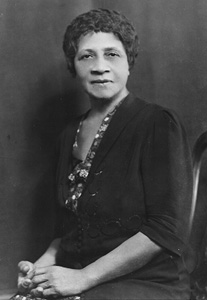Contralto, pianist, pedagogist, administrator, and advocate Lulu Vere Childers had a profound impact on African American Spirituals and European classical music. Childers was the seventh child of 12 born in Dry Ridge, Kentucky, on February 28, 1870, to former enslaved parents, Alex Childres and Eliza Butler Childers originally from New Orleans, Louisiana. Lulu’s siblings were Agnes A. Childers, Della A. Childers, Elizabeth Childers, Hester Childers, Jasper Childers, Martha Childers, Mollie Childres, Nancy Childers Webb, Sebastian Childers, Susan A. Childers, and Esther Smithson from a previous relationship. After being mistreated by the mistress of the plantation, in 1872, the family moved to Howell, Michigan.
Childers graduated from Oberlin College in Oberlin, Ohio in 1896, receiving a Bachelor of Music degree in Voice and Piano from the College’s Conservatory of Music. From 1898 to 1900, she was the music director at Wiley University, Marshall, Texas. While teaching in Texas, she performed with the Eckstein Norton Music Company, an African American school in Cane Spring, Kentucky developed by the Afro-Canadian pianist and pipe organist, Harriet Gibbs Marshall. Her performances were designed to assist with raising money for the operation of the Cane Springs Music Department.
Childers next headed the Music Department at Knoxville College in Tennessee from 1900 to 1905 where she was also the conductor of the college mixed choral ensemble. In 1905, she accepted the position as musical director of Howard University in Washington, DC. There, she established the program as an independent conservatory of music in 1914, and four years later in 1918, she implemented the School of Music’s Bachelor of Music degree. During her tenure at Howard, Childers continued her voice, piano, and music theory studies at Washington Conservatory of Music, Washington, DC. and at the Chicago Musical College.
In 1939, when opera singer Marian Anderson, a close personal friend of Childers, was banned from performing in the Daughters of the American Revolution-controlled Constitution Hall in Washington, D.C. because of her race, the Howard School of Music Concert Series Committee, led by Childers, stood up against this injustice by helping to arrange another venue in the city. Eventually, with the intervention of First Lady Eleanor Roosevelt, Anderson performed at the Lincoln Memorial.
Childers’ retirement in 1940 marked the end of a remarkable 35-year service at Howard University. Her contributions to the institution were celebrated when she received an honorary Doctor of Music degree at the 73rd Annual Commencement in 1942.
Professor Lulu Vere Childers, a revered figure at Howard University, died in Howell, Michigan, on March 6, 1946. She was 76. Her legacy, however, continues. In 1961, Howard named the Music Building, the Lulu Vere Childers Hall which now houses professional facilities such as the Al Freeman, Jr. Environmental Theatre Space, the Gallery of Art, the Dance Studio, the Ira Aldridge Theater, Orchestra, and Choral Rehearsal Facility, and the Howard University Recital Hall. Childers created a platform that prepared numerous future Howard graduates including Grammy Award-winning opera star Jessye Norman, composers Adolphus Cunningham Hailstork III and Richard Smallwood, Metropolitan Opera pianist and vocal coach Sylvia Oden Lee, opera singer Gregory Gardner, pianist singers Roberta Flack, Donnie Hathaway, Hilton Felton, Jr., and Shirley Valerie Horn, opera singer Nelda Ormond, and Grammy Award-winning trumpeter Wallace Roney.
Do you find this information helpful? A small donation would help us keep this available to all. Forego a bottle of soda and donate its cost to us for the information you just learned, and feel good about helping to make it available to everyone.
BlackPast.org is a 501(c)(3) non-profit and our EIN is 26-1625373. Your donation is fully tax-deductible.
“Childers, Lulu V. (Lulu Vere), 1870-1946,” https://id.loc.gov/authorities/names/n2011034134.html;
The 63rd Annual Commencement of Oberlin College, chrome-extension://efaidnbmnnnibpcajpcglclefindmkaj/https://digitalcommons.oberlin.edu/cgi/viewcontent.cgi?article=1062&context=commencement_programs;
“The 73rd Annual Commencement at Howard University,” chrome-extension://efaidnbmnnnibpcajpcglclefindmkaj/https://dh.howard.edu/cgi/viewcontent.cgi?article=1091&context=hugradpro.
Jennifer Eberbach, “Well-rounded history’: Howell once had a thriving Black community,”https://www.livingstondaily.com/story/news/local/community/howell/2024/02/28/well-rounded-history-howell-once-had-a-thriving-black-community/72743126007/.

